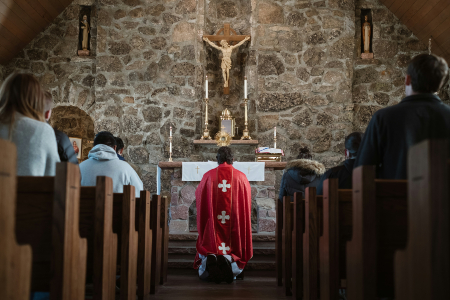St. Gildas
FREE Catholic Classes
Surnamed the Wise; b. about 516; d. at Houat, Brittany, 570. Sometimes he is called "Badonicus" because, as he tells us, his birth took place the year the Britons gained a famous victory over the Saxons at Mount Badon, near Bath, Somersetshire (493 or 516). The biographies of Gildas exist -- one written by an unknown Breton monk of the Abbey of Rhuys in the eleventh century, the other by Caradoc, a Welshman in the twelfth century. Both biographies contain unchronological and misleading statements, which have led some critics to reject the lives as altogether valueless. Ussher, Ware, Bale, Pits, and Colgan endeavour to adjust the discrepancies by contending that there were at least two saints named Gildas, hence their invention of such distinctive surnames as "Albanicus", "Badonicus", "Hibernicus", "Historicus", etc. The more general opinion, however, adopted by Lanigan, Leland, Healy, Stingfleet, Mabilon, Bollandus, and O'Hanlon, is that there was but one St. Gildas. The discrepancies may be accounted for by the fact that the lives were drawn up in separate countries, and several centuries after the saint existed. As to Caradoc's statement that Gildas died at Glastonbury, O'Hanlon remarks that Glastonbury appropriated more saints than Gildas (Lives of Irish Saints, I, 493).
Both narratives agree in several striking details, and may thus be harmonized: Gildas was born in Scotland on the banks of the Clyde (possibly at Dumbarton), of a noble British family. His father's name was Cau or Nau; his brother's, Huel or Cuil. He was educated in Wales under St. Iltut, and was a companion of St. Samson and St. Peter of Léon. Having embraced the monastic state, he passed over to Ireland, where he was advanced to the priesthood. He is said to have lived some time in Armagh, and then to have crossed to North Britain, his teaching there being confirmed by miracles. On his return to Ireland, at the invitation of King Ainmire, he strengthened the faith of many, and built monasteries and churches. The Irish annalists associate him with David and Cadoc in giving a special liturgy or Mass to the second order of Irish saints. He is said to have made a pilgrimage to Rome. On the homeward journey his love of so!itude caused him to retire to the Isle of Houat, off Brittany, where he lived a life of prayer, study and austerity. His place of retreat having become known, the Bretons induced him to establish a monastery at Rhuys on the mainland whither multitudes flocked (Marius Sepet, " St. Gildas de Rhuys", Paris, s.d.). It was at Rhuys he wrote his famous epistle to the British kings. His relics were venerated there till the tenth century, when they were carried for safety into Berry. In the eighteenth century they were said to be preserved in the cathedral of Vannes. He is the patron of several churches and monasteries in Brittany and elsewhere. His feast is locally observed on 29 January; another feast, 11 May, commemorates the translation of his relics.
The authentic work of St. Gildas, "De excidio Britannae liber querulus", is now usually divided into three parts: (1) The preface; (2) A sketch of British history from the Roman invasion to his own time ; (3) An epistle of severe invective addressed to five petty British kings -- Constantine, Vortipor, Cyneglas, Cynan, and Maelgwn. In the same epistle he addresses and rebukes the clergy whom he accuses of sloth and simony. His writings are clearly the work of a man of no ordinary culture and sanctity, and indicate that the author was thoroughly acquainted with the Sacred Scriptures .
Gildas is regarded as the earliest British historian and is quoted by Bede and Alcuin. Two manuscripts copies of his writings are preserved in Cambridge University library.
Join the Movement
When you sign up below, you don't just join an email list - you're joining an entire movement for Free world class Catholic education.
-

-
Mysteries of the Rosary
-
St. Faustina Kowalska
-
Litany of the Blessed Virgin Mary
-
Saint of the Day for Wednesday, Oct 4th, 2023
-
Popular Saints
-
St. Francis of Assisi
-
Bible
-
Female / Women Saints
-
7 Morning Prayers you need to get your day started with God
-
Litany of the Blessed Virgin Mary
U.S. Catholic Parishes Experience Resurgence of Traditional Practices
-

Pope Francis Urges Faith and Prayers for Peace
-

Florida Welcomes Volunteer Chaplains to Public Schools
-
10 Fascinating Details About St. Joseph the Worker: Celebrating His Feast Day - May 1
-
St. Joseph the Worker: Model for Men, Young and Old
Daily Catholic
 Daily Readings for Thursday, May 02, 2024
Daily Readings for Thursday, May 02, 2024 St. Athanasius: Saint of the Day for Thursday, May 02, 2024
St. Athanasius: Saint of the Day for Thursday, May 02, 2024 The Our Father: Prayer of the Day for Thursday, May 02, 2024
The Our Father: Prayer of the Day for Thursday, May 02, 2024- Daily Readings for Wednesday, May 01, 2024
- St. Marculf: Saint of the Day for Wednesday, May 01, 2024
- To Saint Peregrine: Prayer of the Day for Wednesday, May 01, 2024
 Hi readers, it seems you use Catholic Online a lot; that's great! It's a little awkward to ask, but we need your help. If you have already donated, we sincerely thank you. We're not salespeople, but we depend on donations averaging $14.76 and fewer than 1% of readers give. If you donate just $5.00, the price of your coffee, Catholic Online School could keep thriving. Thank you. Help Now >
Hi readers, it seems you use Catholic Online a lot; that's great! It's a little awkward to ask, but we need your help. If you have already donated, we sincerely thank you. We're not salespeople, but we depend on donations averaging $14.76 and fewer than 1% of readers give. If you donate just $5.00, the price of your coffee, Catholic Online School could keep thriving. Thank you. Help Now >
![]()
Copyright 2024 Catholic Online. All materials contained on this site, whether written, audible or visual are the exclusive property of Catholic Online and are protected under U.S. and International copyright laws, © Copyright 2024 Catholic Online. Any unauthorized use, without prior written consent of Catholic Online is strictly forbidden and prohibited.
Catholic Online is a Project of Your Catholic Voice Foundation, a Not-for-Profit Corporation. Your Catholic Voice Foundation has been granted a recognition of tax exemption under Section 501(c)(3) of the Internal Revenue Code. Federal Tax Identification Number: 81-0596847. Your gift is tax-deductible as allowed by law.









 Daily Readings for Thursday, May 02, 2024
Daily Readings for Thursday, May 02, 2024 St. Athanasius: Saint of the Day for Thursday, May 02, 2024
St. Athanasius: Saint of the Day for Thursday, May 02, 2024 The Our Father: Prayer of the Day for Thursday, May 02, 2024
The Our Father: Prayer of the Day for Thursday, May 02, 2024
